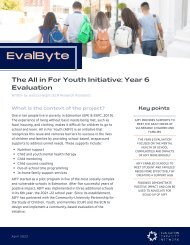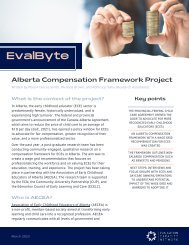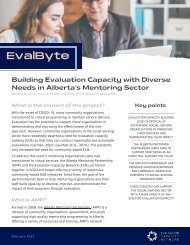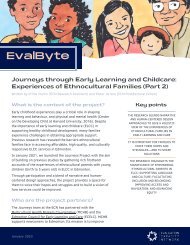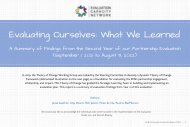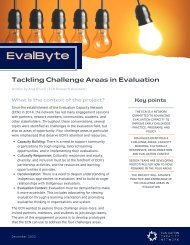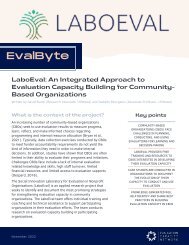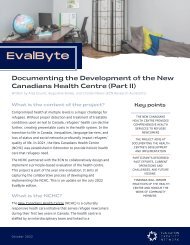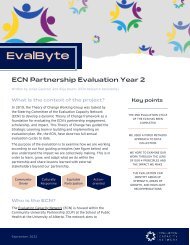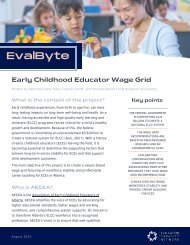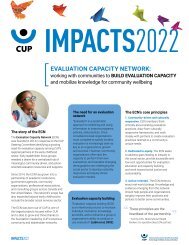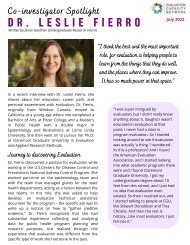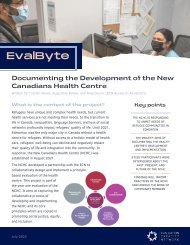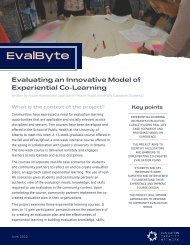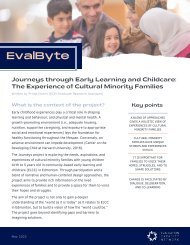Introduction to Community-Based Evaluation
You also want an ePaper? Increase the reach of your titles
YUMPU automatically turns print PDFs into web optimized ePapers that Google loves.
EVALUATING<br />
EARLY CHILDHOOD<br />
DEVELOPMENT PROGRAMS<br />
Slide Deck #1:<br />
<strong>Introduction</strong> <strong>to</strong> <strong>Community</strong>-<strong>Based</strong> <strong>Evaluation</strong>
Do You Want To Evaluate Your Programs To<br />
Better Serve Your Clients?<br />
You are in the right place!<br />
A community-based approach <strong>to</strong> evaluation helps<br />
you <strong>to</strong> tailor your evaluation in a way that is<br />
useful for your organization and your clients.<br />
This series of slides decks will help you <strong>to</strong> plan<br />
and implement a community-based evaluation in<br />
your own organization.
What This Slide Deck Covers<br />
<strong>Introduction</strong> <strong>to</strong> <strong>Community</strong>-<br />
<strong>Based</strong> <strong>Evaluation</strong><br />
1. What is community-based evaluation?<br />
2. Why evaluate early childhood<br />
development programs?<br />
3. What is evaluation capacity?<br />
4. How <strong>to</strong> use these slides
1<br />
What Is <strong>Community</strong>-<strong>Based</strong><br />
<strong>Evaluation</strong>?
Opening Exercise<br />
Consider this statement: “<strong>Evaluation</strong> always makes<br />
programs better”<br />
• If this statement was a scale ranging from strongly agree <strong>to</strong> strongly disagree,<br />
where would you stand?<br />
• Have you always had the same opinion or has your opinion changed over<br />
time?<br />
• If you have changed your opinion, what caused the change? If not, what might<br />
change your opinion?<br />
Strongly<br />
Agree<br />
Where<br />
do you<br />
stand?<br />
Strongly<br />
Disagree
Thinking <strong>Evaluation</strong><br />
What comes <strong>to</strong> mind when you hear the word<br />
evaluation?<br />
• The word evaluation at first may not seem inspiring. However,<br />
evaluation can be embraced as an opportunity for strategic<br />
learning, evidence-based decision-making, innovative<br />
reflexive practice, and more.<br />
• The trick is <strong>to</strong> make evaluation work for you and your organization.<br />
• Intrigued? Read on!
Defining <strong>Evaluation</strong><br />
• Let’s start with the basics. What is evaluation?<br />
• <strong>Evaluation</strong> can be defined as an organized and systematic<br />
approach <strong>to</strong> collecting information (about activities, impacts,<br />
and effectiveness) that helps <strong>to</strong> improve a program (or<br />
organization) and describe its accomplishments.
The Drivers of <strong>Evaluation</strong><br />
REACTIVE<br />
• In response <strong>to</strong> funder accountability<br />
PROACTIVE<br />
• For healthy organizational improvement<br />
• For adaptive management in developing innovation<br />
MEANINGFUL EVALUATION<br />
• Not only does evaluation<br />
• But also uses evaluation results
A <strong>Community</strong>-<strong>Based</strong> Approach<br />
• How is community-based evaluation different from other<br />
approaches <strong>to</strong> evaluation?<br />
• What makes evaluation distinctively “community-based”?<br />
Let’s consider the<br />
hallmarks, goals, and<br />
phases of a communitybased<br />
approach
Three Hallmarks of <strong>Community</strong>-<strong>Based</strong><br />
<strong>Evaluation</strong><br />
<strong>Community</strong>-based evaluation strives <strong>to</strong> be …<br />
Stakeholder-<br />
Driven<br />
Participa<strong>to</strong>ry<br />
Action-<br />
Oriented<br />
Ensure that the evaluation is practically relevant <strong>to</strong> stakeholders<br />
and is driven by the program’s unique theory of change<br />
Program stakeholders and researchers equitably share control of<br />
the evaluation agenda through active and reciprocal involvement in<br />
the evaluation design, implementation and dissemination<br />
The evaluation process and results are useful <strong>to</strong> stakeholders in<br />
making improvements <strong>to</strong> the program and contribute <strong>to</strong><br />
communities where everyone is supported and belongs
Three Goals of <strong>Community</strong>-<strong>Based</strong><br />
<strong>Evaluation</strong><br />
Engaging People<br />
Building stronger<br />
relationships among<br />
stakeholders so that<br />
they are better<br />
equipped <strong>to</strong> do and use<br />
evaluation <strong>to</strong>gether<br />
Learning<br />
Together<br />
Gaining new insights<br />
through systematic<br />
and rigorous<br />
evaluation research<br />
Sharing Results<br />
Communicating what has been<br />
learned in ways that enable<br />
people <strong>to</strong> use the evaluation<br />
results
Four Phases Of <strong>Community</strong>-based<br />
<strong>Evaluation</strong><br />
Relational:<br />
• Negotiating mobilization of<br />
knowledge and people<br />
Technical:<br />
• Sharing learnings<br />
• Initiating new action<br />
#1 Laying the<br />
Foundation<br />
Relational:<br />
• Negotiating goals and roles<br />
Technical:<br />
• Identifying stakeholders and organizing<br />
steering committee<br />
• Identifying assumptions about evaluation<br />
• Highlighting the theory of change<br />
• Identifying the purpose of the evaluation<br />
USE<br />
evaluation<br />
#4 Acting on<br />
Findings<br />
#2 <strong>Evaluation</strong><br />
Planning<br />
DO<br />
evaluation<br />
Relational:<br />
• Negotiating meaning<br />
and learning<br />
Technical:<br />
• Gathering information ethically<br />
• Analyzing and summarizing<br />
#3 Information<br />
Gathering/Analysis<br />
Relational:<br />
• Negotiating perspectives <strong>to</strong> include<br />
Technical:<br />
• Determining the evaluation questions<br />
• Developing methods for collecting information<br />
• Developing an analysis plan<br />
In the remaining slide decks, we will unpack this diagram, one phase at a time.
Implementation Strategies<br />
Stakeholder steering group<br />
• Providing guidance and “conscience” • Facilitating cross-stakeholder perspectives<br />
Diversity on research teams<br />
• Including people with lived experience • Privileging facilitation & mobilization skills<br />
Ongoing training and support<br />
• Equipping researchers for consistency • Equipping partners for deeper engagement<br />
Open forums and feedback events<br />
• Sharing & verifying results • Discussing & prioritizing solutions<br />
Clear and creative summaries<br />
• Crafting digestible written, oral & visual summaries • Inviting artistic expressions<br />
Plans for future action<br />
• Deciding on concrete recommendations • Determining next evaluation cycles
Two General Approaches To <strong>Evaluation</strong><br />
One external person/group has<br />
expertise that is prescribed<br />
Expert-<strong>Based</strong><br />
The collective has different kinds<br />
of expertise that emerges<br />
<strong>Community</strong>-<strong>Based</strong><br />
Whether or not you use external consultants <strong>to</strong> help with your<br />
evaluation, a community-based approach helps <strong>to</strong> make the evaluation<br />
meaningful and useful <strong>to</strong> you.
Summary Definition<br />
An “approach that involves active<br />
participation of stakeholders,<br />
those whose lives are affected by the<br />
issue being studied, in all phases of<br />
research for the purpose of<br />
producing useful results <strong>to</strong> make<br />
positive changes.”<br />
Nelson, Ochocka, Griffin & Lord, 1998, p.12
2<br />
Why Evaluate Early Childhood<br />
Development Programs?
Why?<br />
Evaluating early childhood<br />
development programs allows us <strong>to</strong><br />
…<br />
• Better understand how practices, programs,<br />
and policies are working<br />
• Generate evidence that informs decisionmaking<br />
• Improve existing practices and programs <strong>to</strong><br />
optimize child development<br />
(Shonkoff & Phillips, 2000)
The Need…<br />
…for evaluation in the early childhood development<br />
field:<br />
• Children's development in their early years significantly affects the economic and social<br />
wellness of our communities. (Hertzman & Boyce, 2010; Shonkoff & Levitt, 2010)<br />
• Policies and programs that support the development and wellness of children in their early<br />
years provide great return on investment by reducing the need for interventions in later<br />
years. (Deane et al., 2018; Duncan et al., 2007; Heckman, 2008; OECD, 2012; Shonkoff & Phillips, 2000)<br />
• Despite Canada's investment in early childhood programs, indica<strong>to</strong>rs show shortfalls. In<br />
2016, UNICEF ranked Canada 26th of 35 high-income countries for child well-being.<br />
• Indigenous children and English-language learners of immigrant and refugee backgrounds are<br />
less ready <strong>to</strong> begin education, and are made vulnerable by economic, cultural, and language
The Gaps…<br />
…in evaluating early childhood development<br />
programs:<br />
• More and more, program managers are asked <strong>to</strong> provide successful evaluation<br />
results when seeking or renewing funding<br />
• There are few readily available <strong>to</strong>ols <strong>to</strong> assist in measuring outcomes<br />
• Often there can be <strong>to</strong>o much data which confuses decision-making and slows<br />
implementation<br />
• His<strong>to</strong>rically evaluations have been <strong>to</strong>p-down which doesn't allow for the<br />
same community self-determination, innovation, and use of insights that support<br />
child wellness as community-based evaluation
In Summary…<br />
<strong>Evaluation</strong><br />
• <strong>Evaluation</strong> of existing programs and policies will allow us <strong>to</strong> understand<br />
what is working and what is not<br />
<strong>Community</strong>-<strong>Based</strong> <strong>Evaluation</strong><br />
• A community-based evaluation will help <strong>to</strong> address some of the<br />
challenges in the early childhood development in Canada by showcasing<br />
successes and identifying areas of improvement in a culturally sensitive<br />
and practical manner<br />
Supporting Action<br />
• Local and timely evidence-based information resulting out of evaluations<br />
supports beneficial action and decision-making
But We Lack Capacity!<br />
• <strong>Community</strong>-based evaluation sounds great, but where do we even begin?<br />
• What happens if we lack the capacity <strong>to</strong> conduct evaluation?<br />
• What does evaluation capacity even mean?
3<br />
What Is <strong>Evaluation</strong> Capacity?
<strong>Evaluation</strong> Capacity<br />
At the individual level<br />
• Skills<br />
• Knowledge, and<br />
• Attitudes<br />
At the organizational<br />
level<br />
• Required resources and have<br />
• Supportive cultures<br />
At the environmental<br />
level<br />
• Funding requirements<br />
• <strong>Evaluation</strong> expectations<br />
Enabling<br />
Environment<br />
for <strong>Evaluation</strong><br />
Organizatio<br />
nal <strong>Evaluation</strong><br />
Capacity<br />
Individual<br />
<strong>Evaluation</strong><br />
Capacity
Building A Culture Of <strong>Evaluation</strong> In Your<br />
Organization<br />
Individual<br />
Attitude Toward<br />
<strong>Evaluation</strong><br />
Organizational<br />
Culture<br />
Organizational<br />
Leadership<br />
Organizational<br />
Commitment<br />
<strong>to</strong> <strong>Evaluation</strong><br />
Individual Motivation<br />
<strong>to</strong> Conduct & Use<br />
<strong>Evaluation</strong><br />
Individual<br />
<strong>Evaluation</strong> Skill<br />
Source: El Hassar, B. (2018). Development and validation of an evaluation<br />
capacity instrument for the early childhood field. (Unpublished doc<strong>to</strong>ral<br />
dissertation). University of Alberta, Edmon<strong>to</strong>n, Alberta, Canada.
Your Turn<br />
Think of these questions…<br />
• What barriers <strong>to</strong> evaluation might there be within<br />
your organization?<br />
Test your evaluation<br />
capacity with this<br />
evaluation readiness<br />
<strong>to</strong>ol<br />
• What individual barriers might hold you back from<br />
evaluation?<br />
• What is your group’s capacity <strong>to</strong> evaluate<br />
your early childhood development
4<br />
About These Slide Decks
Background To These Slides<br />
The series of five slide decks along with a complimentary evaluation workbook are intended<br />
<strong>to</strong> equip individuals and organizations in the early childhood field who want <strong>to</strong> learn about how <strong>to</strong> take<br />
a community-based approach <strong>to</strong> their evaluations. The <strong>to</strong>ols are part of the EvalHub of the <strong>Evaluation</strong><br />
Capacity Network (ECN) that emphasize an approach <strong>to</strong> evaluation that is community-driven,<br />
participa<strong>to</strong>ry and action-oriented.<br />
These <strong>to</strong>ols were developed by the Centre for <strong>Community</strong> <strong>Based</strong> Research (CCBR) in collaboration<br />
with the <strong>Evaluation</strong> Capacity Network. The Ontario Network of <strong>Community</strong> Action Program for<br />
Children/Canada Prenatal Nutrition Program (CAPC/CPNP) Projects was an external reference group<br />
<strong>to</strong> ensure the <strong>to</strong>ols are relevant and meaningful <strong>to</strong> those working in the early childhood field.<br />
The slides and evaluation workbook were originally designed as part of a national project “Evaluating<br />
Refugee Programs”, led by CCBR and ECN. This project aimed <strong>to</strong> build evaluation capacity in the<br />
resettlement sec<strong>to</strong>r (www.eval4refugee.ca). During this project, the slides were presented <strong>to</strong> over<br />
300 workshop participants in 12 communities across Canada.<br />
These slides and the complimentary evaluation workbook also draw on input from community<br />
stakeholders through CCBR’s his<strong>to</strong>ry of working on over 400 projects on a variety of social issues<br />
since 1982.
Overview Of The<br />
Slide Decks<br />
#4 Acting on<br />
Findings<br />
#1 Laying the<br />
Foundation<br />
#2 <strong>Evaluation</strong><br />
Planning<br />
#3 Information<br />
Gathering/Analysis<br />
Slide deck #1: <strong>Introduction</strong> <strong>to</strong> community-based evaluation<br />
Slide deck #2: Laying the foundation in community-based evaluation<br />
Slide deck #3: <strong>Community</strong>-based evaluation planning<br />
Slide deck #4: Information gathering and analysis<br />
Slide deck #5: Acting on findings<br />
You are<br />
here!
WHAT<br />
Understand the basics of<br />
community-based evaluation<br />
LEARNING<br />
OBJECTIVES<br />
WHY<br />
Understand why community-based<br />
evaluation is important for early<br />
childhood development programs<br />
HOW<br />
Understand the basic steps for<br />
conducting your own communitybased<br />
evaluations
How To Use These Slide Decks<br />
This is a self-study <strong>to</strong>ol that you can review at your own pace.<br />
Start with the slides and practice on the evaluation workbook.<br />
look for # <strong>to</strong><br />
find the<br />
corresponding<br />
exercise page on the<br />
workbook!<br />
Visit www.evaluationcapacitynetwork.com <strong>to</strong> access<br />
• The complimentary evaluation workbook<br />
• Complimentary live webinars’ recordings
About CCBR<br />
Ø The Centre for <strong>Community</strong> <strong>Based</strong> Research (CCBR) is a non-profit organization located on<br />
the University of Waterloo campus. It is a champion and pioneer of collaborative and actionoriented<br />
research in Canada. Established in 1982, CCBR uses research and education <strong>to</strong><br />
build more responsive and supportive communities, especially for people who experience<br />
limited access <strong>to</strong> power and opportunity. CCBR has conducted over 100 projects related <strong>to</strong><br />
family support and early childhood development.<br />
Ø Learn more at www.communitybasedresearch.ca
About ECN<br />
Ø The <strong>Evaluation</strong> Capacity Network (ECN), located on the University of Alberta campus, is a<br />
national interdisciplinary and intersec<strong>to</strong>ral research network focused on enhancing the<br />
evaluation capacity of the early childhood field and social sec<strong>to</strong>r more broadly. ECN draws<br />
on the skills and expertise of academics, students, evalua<strong>to</strong>rs, funders, and community<br />
organizations across Canada <strong>to</strong> curate and create evaluation learning opportunities, access<br />
<strong>to</strong> resources and expertise.<br />
Ø Learn more at www.evaluationcapacitynetwork.com
Sources<br />
Deane L., Glass J., Vystrcil-Spence I., Mignone J.(2018).Live-In Family Enhancement (LIFE): A comprehensive program for<br />
healing and family reunification. First Peoples Child & Family Review, 13 (1), 35-49.<br />
Duncan, G. J., Dowsett, C. J., Claessens, A., Magnuson, K., Hus<strong>to</strong>n, A. C., Klebanov, P., ... Japel, C. (2007). School<br />
readiness and later achievement. Developmental Psychology, 43(6), 1428-1446.<br />
El Hassar, B. (2018). Development and validation of an evaluation capacity instrument for the early childhood field.<br />
(Unpublished doc<strong>to</strong>ral dissertation). University of Alberta, Edmon<strong>to</strong>n, Alberta, Canada.<br />
Einarsdóttir, J. (2007). Research with children: Methodological and ethical challenges. European early childhood education<br />
research journal, 15(2), 197-211.<br />
Georgis, R., Gokiert, R. J., & Kirova, A.(2018). Research considerations in early childhood partnerships with immigrant and<br />
refugee communities: Researcher reflections. In S. Madrid, M.J. Moran, R. Brookshire, & M. Buchanan (Eds.),<br />
Collaborative Research Methodologies in Diverse Early Care and Education Contexts (pp. 115-129).New York,NY:<br />
Routledge.<br />
Gokiert, R. (2018). <strong>Evaluation</strong> capacity network: Collaborating for community-driven and culturally relevant early childhood<br />
practices, programs, and policies partnership grant. University of Alberta.<br />
Gokiert, R. J., Georgis, R., Robinson, T., Alexander First Nation, Alexis Nakota Sioux Nation, O’Chiese First Nation,<br />
Sunchild First Nation, & Yellowhead Tribal College. (2014). First Nation child development: Collective community<br />
report. Edmon<strong>to</strong>n, AB: <strong>Community</strong>-University Partnership for the Study of Children, Youth, and Families, University of<br />
Alberta.
Sources<br />
Heckman, J.J. (2008). The case for investing in disadvantaged young children. In First Focus (Ed.), Big ideas for<br />
children: Investing in our nation’s future (pp. 49-58). Washing<strong>to</strong>n, DC: First Focus.<br />
Hertzman, C., & Boyce, T. (2010). How experience gets under the skin <strong>to</strong> create gradients in developmental health.<br />
Annual Review of Public Health, 31(1), 329-347.<br />
Janzen, R., Ochocka, J., & S<strong>to</strong>bbe. A. (2016) Towards a theory of change for community-based research projects.<br />
Engaged Scholar Journal: <strong>Community</strong>-Engaged Research, Teaching, and Learning 2(2), 44-64.<br />
Janzen, R., Ochocka, J., Turner, L., Cook, T., Franklin, M., & Deichert, D. (2017). Building a community-based culture<br />
of evaluation. <strong>Evaluation</strong> and Program Planning, 65, 163–170.<br />
Ochocka, J. & Janzen, R. (2014). Breathing life in<strong>to</strong> theory: Illustrations of community-based research hallmarks,<br />
functions, and phases. Gateways: International Journal of <strong>Community</strong> Research and Engagement. 7, 18-33.<br />
Organisation for Economic Cooperation and Development (OECD). (2012). Education at a glance 2012: OECD<br />
indica<strong>to</strong>rs. Retrieved from https://www.oecd.org/edu/EAG%202012_e-book_EN_200912.pdf<br />
Shonkoff, J. P., & Levitt, P. (2010). Neuroscience and the future of early childhood policy: Moving from why <strong>to</strong> what<br />
and how. Neuron, 67(5), 689-691.<br />
Shonkoff, J. P., & Phillips, D. A. (Eds.). (2000). From neurons <strong>to</strong> neighborhoods: The science of early childhood<br />
development. Washing<strong>to</strong>n, DC: National Academy Press.



